Web Archives: Monday, 11 April Tuesday, 12 April Wednesday-Thursday 13-14 April Friday, 15 April Monday, 18 April Tuesday, 19 April
Highlights from Wednesday, 20 April
CSD-13's High-Level Segment began on Wednesday with opening statements from key speakers. This was followed by interactive discussions and statements on turning political commitments into action, meeting the Millennium Development Goals (MDGs) related to water, sanitation and human settlements, and the impact of natural disasters on water, sanitation and human settlements. Delegates also continued to negotiate the Chair's revised outcome document, holding informal parallel meetings in the afternoon and evening.
|
| |
| Opening of the High-Level Segment |
|
|
|
JoAnne DiSano, Director, Division for Sustainable Development, Under Secretary-General for Economic and Social Affairs Jose Antonio Ocampo, Deputy Secretary-General Louise Fréchette, and CSD Chair John Ashe |
|
|
|
| Under Secretary-General for Economic and Social Affairs Jose Antonio Ocampo with Deputy Secretary-General Louise Fréchette (left) and with JoAnne DiSano, Director, Division for Sustainable Development (right) |
|
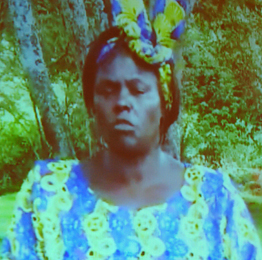 |
|
|
Professor Wangar Maathai, Nobel Laureate, in a video recording a statement to the Commisssion, urged action to make environment central to the management of human affairs, noted that humans cannot survive without other species, and called for a rethinking of our place on the planet.
CSD Chair John Ashe reviewed progress achieved in the work of CSD-13 to date, highlighting reports received from intergovernmental meetings and the panel discussions held. He emphasized his objective of arriving at a short outcome document, which would concentrate on deliverables and actions, without redefining agreed concepts or principles. Ashe then explained the High-Level Segment's procedures, and asked for concise presentations.
Deputy Secretary-General Louise Fréchette noted that the three thematic issues of water, sanitation and human settlement addressed by CSD-13 are among the most basic, adding that the pillars of sustainable development converge in the Commission's work to a greater degree than in any international body. |
|
|
|
| |
| Wangari Mathai addresses the CSD (left) |
| |
| High Level Segment: Meeting the MDGs related to water, sanitation and human settlements targets |
| |
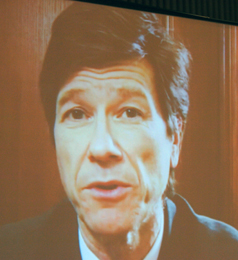 |
|
|
| |
Jeffrey Sachs, Special Advisor to the Secretary-General and Director of the Millennium Project, addressing the CSD by video,
noted that 2005 is a crucial year in determining the fate of the MDGs. He urged governments, in particular the US , to live up to their ODA commitments, which had been confirmed by the Monterrey Consensus.
Stravos Dimas, European Commissioner for the Environment, discussed water-related initiatives, noting that flexibility and innovation are essential. Explaining that the EU is well on its way to meeting its ODA and Monterrey targets, he said it could be timely for the EU to consider new commitments.
Robert Orr, Assistant Secretary-General for Policy Planning in the Executive Office of the Secretary-General,
said sustainable development is at the heart of the High-level Plenary Meeting in September 2005, adding that efforts to defeat poverty will be in vain if resource depletion continues unabated. |
| |
|
| |
Ln Sisulu, Minister of Housing, South Africa, highlighted development problems for Africa and the need to honor the Monterrey Consensus.
Ian Campbell, Minister for the Environment, Australia,
highlighted the importance of success in the Doha trade talks and supported a higher profile for practical partnerships in the CSD process.
Lord Whitty of Caberwell, Minister for Farming, Food and Sustainable Energy, UK,
said problems with delivery mechanisms, funding and resources need to be addressed. |
| |
|
| |
Paula Lehtomäki, Minister for Foreign Trade and Development, Finland, suggested that CSD-13 address issues of interlinkages, effective follow-up and monitoring systems.
Sylvia Masebo, Minister of Local Government and Housing, Zambia, called for targets and a timeframe for new financial resources. |
| |
|
Claude Wiseler, Head of Delegation of Luxembourg and EU Presidency Representative, consulting with Donald Buchanan, Minister of Water and Housing, Jamaica (left)
Taker E. Jehaimi, Secretary of hte General People's Committee for Planning (Minister for Planning), Libya, supported increased financial support and good governance.
Dick Roche, Minister for Environment, Heritage and Local Government, urged CSD-13 to make a significant contribution to the High-level Plenary Meeting. |
|
| High Level Segment: Turning Political commitments into action |
| |
|
|
Kwak Kyul-ho, minister of Environment, Republic of Korea, noted governments' role in creating an enabling environment and the importance of an institutional foundation to facilitate and mobilize financial resources.
Claude Wiseler, Head of Delegation of Luxembourg and EU Presidency Representative, highlighted CSD-13's responsibility to set a strong precedent for future CSD cycles, and discussed the importance of the current themes being addressed at CSD-13 for all MDGs.
Donald
Buchanan, Minister of Water and Housing,
Jamaica, focused on the need for financial resources, calling for debt cancellation, increased ODA, market access and resources for UN-HABITAT and UNHCR.
|
| |
|
| |
Pieter van Geel, State Secretary for Sustainable Development, the Netherlands, called for major increases in investment in water, sanitation, sustainable energy, shelter, transport and sustainable natural resource management.
Paula Dobriansky, Under-Secretary of State for Global Affairs, US, discussed the Monterrey Consensus and Millennium Challenge Account Initiative, and praised CSD-13 for its policy-oriented work.
Jürgen Trittin, Environment Minister, Germany, supported the creation of a World Environment Organization and
called for a strong and clear message to be sent to the General Assembly's High-level Plenary Meeting on the urgency and importance of what needs to be done on the issues CSD-13 is addressing. |
| |
|
| |
CSD-12 Chair Børge Brende, Norway 's Minister of Trade and Industry, highlighted significant problems in the areas of water, sanitation, and housing. Stressing that 2005 is a critical year for the MDGs, he proposed scaling-up efforts, and said CSD-13 should strive to operationalize international commitments
|
|
|
| |
Christine Churcher, Minister of Environment and Science, Ghana,
urged increased ODA, technology transfer, and capacity building.
Marthinus Van Schalkwyk, Minister of Environmental Affairs and Tourism,
urged greater action on finance, market access, investment, technology, and good governance, and called for halving the number of slum dwellers by 2020.
Lamine BA, Minister of Prevention, Public Hygiene and Sanitation, Senegal, highlighted the Dakar Roadmap and underscored that education of population is crucial for sanitation. |
| |
|
|
|
| High Level Segment: Impact of natural disasters on water, sanitation and human settlements-prevention and response |
|
|
| |
|
|
Salvano
Briceño, International Strategy for Disaster Reduction,
Michel Jarraud, Secretary-General, World Meteorogical Organization, JoAnne DiSano, Director, Division for Sustainable Development, and Vice-Chair Dagmara Berbalk |
| |
|
|
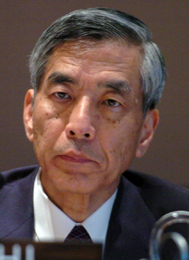 |
|
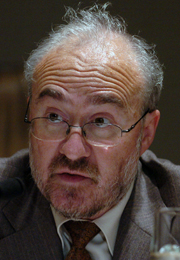
|
|
Masaki Konishi, Ambassador of Japan for Global Environmental Affairs, stressed the importance of disaster-resilient infrastructure.
Salvano Briceño, International Strategy for Disaster Reduction, highlighted the effects of the tsunami, drew attention to the Hyogo Framework for Action, and noted that disaster reduction should be considered as a cross-cutting issue.
Michel Jarraud, Secretary-General, World Meteorogical Organization, noted that most natural disasters are meteorological and particularly impact LDCs, referencing both drought and climate change, and urging increased preparedness, awareness and adaptive measures |
|
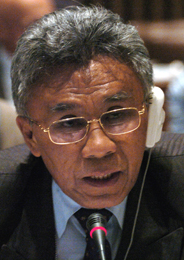 |
|
|
| |
Indonesia expressed its gratitude, noting that the main infrastructure systems hit by the tsunami were its water and sanitation facilities and human shelters (left) and Serge Lepeltier, Minister of Ecology and Sustainable Development, France, and Vice-Chair Dagmara Berbalk
|
Side Event: Monitoring and Evaluation: a booster to achieve the Millennium and Johannesburg goals on water and sanitation
|
| |
|

|
|
|
Tamsir N'Diaye (Director of the Environment Observatory, Senegal River Organisation), Mario Quagliotti, Ministry of Foreign Affairs, Italy, Masaki Konishi, Ministry of Foreign Affairs, Japan, and Serge Lepeltier, Minister of Ecology and Sustainable Development, France
|
|
|
|
|
| Madagascar's first experimental community-run marine protected area: An experimental, community-led, scheme in Madagascar aims to be one of these light-houses by illuminating how partnerships between local people, research institutes and NGOs can deliver marine conservation and sustainable livelihoods. The project, focused around the 1200-strong community of Andavadoaka, is balancing the needs of local fishermen and protection of the area's important coral reefs. |
|
| Harvesting seabuckthorn at the top of the world: The international HimalAsia Foundation together with local Tibetan cooperatives and a family of traditional medical practitioners are developing a sustainable programme for cultivating and marketing seabuckthorn and other medicinal plants for the local and international market. |
|
|
|
Side Event: Decade of Education for Sustainable Development |
| |
| Aline Bory-Adams, Chief of Section for Education for Sustainable Development, UNESCO |
|
|
|

